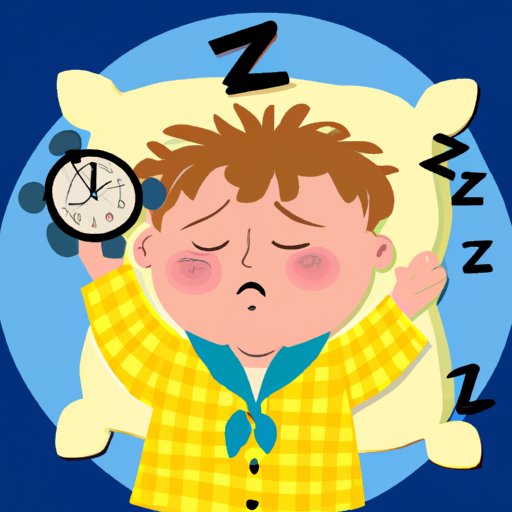Introduction
Sleep is an essential part of our lives and plays a critical role in our physical and mental wellbeing. While the amount of sleep people need varies from person to person, it’s important to prioritize getting enough sleep each night. In this article, we’ll explore the importance of sleep, what time to go to bed, and how to establish a regular sleep schedule.

Analyzing How Much Sleep We Need to Function Properly
According to the National Sleep Foundation, adults aged 18-64 need 7-9 hours of sleep a night, while adults over 65 should aim for 7-8 hours of sleep. Teenagers need 8-10 hours of sleep per night, while school-aged children need 9-12 hours of sleep. However, these numbers are only guidelines, as some people may need more or less sleep than others.
In order to function properly, it’s important to get enough sleep and to get the right type of sleep. Sleep can be divided into two main stages: rapid eye movement (REM) sleep and non-REM sleep. REM sleep is when we dream and is thought to be important for learning and memory. Non-REM sleep is divided into three stages: light, deep, and ultra-deep. Light sleep is when we drift in and out of consciousness, deep sleep is when our body repairs itself, and ultra-deep sleep is when our brain consolidates memories.
Not getting enough sleep can have a significant impact on our physical and mental health. Insufficient sleep can lead to decreased concentration, difficulty making decisions, irritability, and fatigue. Over time, not getting enough sleep can also increase the risk of chronic conditions such as obesity, diabetes, heart disease, and depression.

Examining the Ideal Bedtime for Different Age Groups
The ideal bedtime will vary depending on age. It’s important to get your child into a regular sleep routine so they can get the right amount of sleep. For school-aged children, the American Academy of Pediatrics recommends that they get 9-12 hours of sleep per night. This means that they should be going to bed between 7-8pm. For teenagers, the National Sleep Foundation recommends 8-10 hours of sleep per night. This means they should be going to bed between 9-11pm.
For adults, the National Sleep Foundation recommends 7-9 hours of sleep per night. This means that they should be going to bed between 10-12pm. For adults over 65, the NSF recommends 7-8 hours of sleep per night, which means they should be going to bed between 10-11pm.
Exploring Benefits of Going to Bed Early
Going to bed early has a number of physical, mental, and social benefits. Physically, getting enough sleep helps to strengthen the immune system and reduce inflammation. Mentally, it can help improve memory, focus, and problem-solving skills. Socially, it can help improve relationships with family and friends, as well as giving you more energy to participate in activities.
Studies have also shown that people who go to bed earlier tend to have better overall health. They eat healthier, exercise more, and are less likely to be overweight or obese. Additionally, getting enough sleep can help reduce stress and anxiety levels.
Investigating How to Establish a Healthy Bedtime Routine
Establishing a regular bedtime routine is essential for getting enough sleep. The first step is to develop a regular sleep schedule. This means going to bed and waking up at the same time every day, even on weekends. It’s also important to create a relaxing pre-bed environment. This means avoiding screens (TV, phones, tablets, etc.) before bed and creating a calm atmosphere in the bedroom.
It’s also important to avoid stimulants before bed. This means limiting caffeine, alcohol, and nicotine consumption in the evening. Additionally, it’s important to limit naps during the day, as this can interfere with your ability to fall asleep at night.

Looking at Ways to Wind Down Before Bedtime
In order to get enough sleep, it’s important to wind down before bedtime. Some suggested activities include reading, listening to calming music, taking a warm bath or shower, and engaging in gentle stretching or yoga. It’s also important to identify any stressors that might be interfering with your ability to wind down. This could include worrying about work, money, or relationships.
If you’re having trouble winding down, it can help to practice mindfulness or meditation. These activities can help to clear the mind and reduce stress levels. Additionally, it can help to write down any worries or concerns in a journal before bed, as this can help to process them and take them off your mind.
Understanding the Effects of Too Little Sleep
Not getting enough sleep can have both short- and long-term effects on our health. In the short-term, insufficient sleep can lead to decreased concentration, difficulty making decisions, irritability, and fatigue. Over time, not getting enough sleep can increase the risk of chronic conditions such as obesity, diabetes, heart disease, and depression.
It’s also important to recognize the warning signs of sleep deprivation. These include yawning, headaches, poor performance at work or school, and difficulty focusing. If you’re experiencing these symptoms, it’s important to speak to your doctor and make sure you’re getting enough sleep.
Conclusion
Getting enough sleep is essential for physical and mental wellbeing. It’s important to understand the recommended amount of sleep for different age groups and to establish a healthy bedtime routine. Going to bed earlier can have a number of physical, mental, and social benefits, and can help to reduce the risk of chronic conditions. Finally, it’s important to recognize the warning signs of sleep deprivation and seek help if needed.


